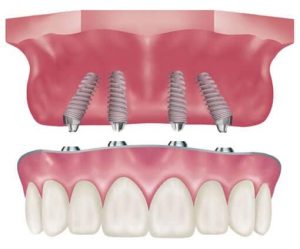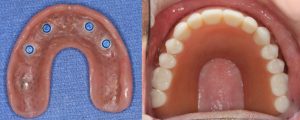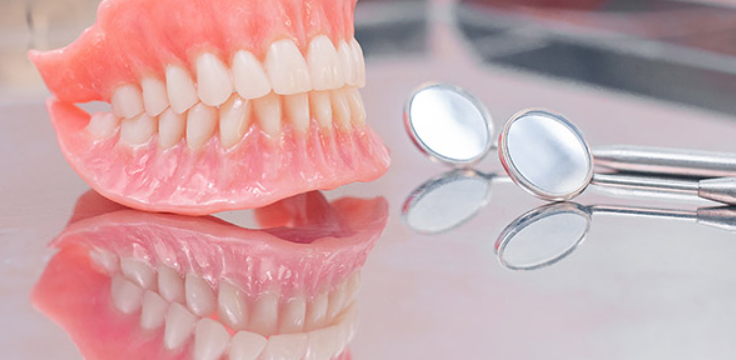
If you’re wondering how many implants for upper denture are needed, typically it’s four to six. This number ensures your denture is stable and functional. Factors like jawbone density, personal needs, and lifestyle influence the exact count. Read on to learn more about these factors and what to expect in the procedure.
Key Takeaways
- Dental implants offer a permanent solution for missing teeth, preventing bone loss and enhancing the functionality of upper dentures compared to traditional options.
- Typically, four to six implants are recommended for upper dentures, with factors such as jawbone density and individual needs influencing the optimal number.
- Implant-supported upper dentures provide improved comfort, stability, and quality of life, allowing users to enjoy a more natural experience and greater confidence in daily activities.
Understanding Upper Dentures with Implants
Dental implants have revolutionized the field of dentistry, providing a permanent solution for missing teeth. Unlike traditional dentures, which are removable, a dental implant serves as a permanent tooth root made typically from titanium, offering unparalleled stability and support. This technology keeps your upper denture securely in place, doing away with adhesives and the discomfort of shifting dentures.
One of the most significant advantages of dental implants is their ability to prevent bone loss. When teeth are missing, the jawbone is at risk of losing bone mass due to the lack of stimulation that natural tooth roots provide. Dental implants stimulate bone regeneration, helping to maintain the integrity of the jawbone and the overall structure of the face. This preservation of facial aesthetics also supports long-term oral health.
Implant-supported dentures function much like natural teeth, enhancing your ability to chew and speak comfortably. They improve jaw health by providing the necessary support that prevents the lower face from losing definition. This combination of functionality and health benefits makes implant-supported upper jaw dentures a superior choice over traditional dentures, especially for those concerned about their upper or lower jaw.
Ideal Number of Implants for Upper Dentures
Determining the ideal number of dental implants for upper dentures is crucial for achieving optimal stability and functionality. Typically, four to six implants are recommended for upper dentures to ensure proper stability and even pressure distribution across the prosthesis. This range provides a balanced approach, offering sufficient support without compromising the integrity of the jawbone or the surrounding structures.
Jawbone density and patient-specific needs often dictate the choice between four and six implants. Although four implants usually offer excellent support, additional implants may be necessary for enhanced stability, particularly in cases of lower bone quality or other complications. This raises the question of how many implants might be ideal for each individual situation.
Factors Influencing Implant Count
Several factors influence the number of dental implants required for upper dentures. Jawbone density is a primary consideration. Low jawbone density may necessitate five or six implants for adequate stability and support. The softer structure of the upper jawbone often necessitates the use of more implants compared to the lower jaw, which typically has denser bone.
Bruxism, or teeth grinding, is another critical factor. Teeth grinders may need extra implants to secure the replacement teeth and protect the prosthesis. Preferences regarding denture stability and the choice between fixed or removable designs also influence the number of required implants.
Significant bone loss may require more shorter implants or a bone graft to establish a stable foundation. Fewer implants usually enhance stability, significantly influencing patient decisions and outcomes.
Benefits of Implant-Supported Upper Dentures

Stability from implant-supported dentures enhances overall quality of life. Patients can enjoy a wider variety of foods without worrying about denture slippage. This functionality extends to daily activities, providing confidence and boosting self-esteem.
Many users find implant-supported dentures offer a more lifelike experience than conventional options. Their close mimicry of natural teeth and artificial teeth helps restore both the physical and psychological effects of tooth loss, enabling confident smiles, speech, and interaction with implant denture.
Procedure for Upper Denture Implants
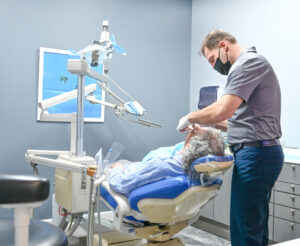
Local anesthesia is typically administered on the day of surgery to ensure comfort during tooth extraction and implant placement. An unhealthy or insufficiently dense jawbone may require a bone graft to provide a stable foundation for the implants. The grafting process involves adding bone material to the jawbone and allowing it to integrate over time.
Post-surgery, following the dentist’s instructions carefully promotes healing. Avoiding smoking, drinking with a straw, and other activities that could disrupt the surgical site is advised. Proper post-operative care, including cleanliness and attending follow-up appointments, is essential for implant success and overall healing.
Cost Considerations for Upper Denture Implants
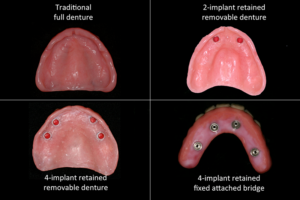
Traditional dentures may seem less expensive initially, but implant-supported dentures often prove more cost-efficient in the long term. Traditional dentures require frequent adjustments and replacements, leading to additional expenses over time. In contrast, the durability and stability of implants reduce ongoing costs, making them a more viable long-term investment.
Insurance plans vary in coverage details, including waiting periods and reimbursement percentages. For instance, Physicians Mutual offers a lifetime limit of $1,000 for implant coverage, while Spirit Dental has no waiting period but reimburses only 25% of costs. Reviewing and comparing these plans is crucial to find the best fit for your financial situation and dental needs.
Comparing Fixed vs. Removable Implant-Supported Dentures
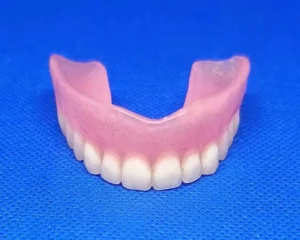
Removable implant-supported dentures are designed for daily detachment and cleaning. This flexibility benefits those who prefer simpler cleaning routines or have significant bone loss, as removable options require less support. Additionally, removable dentures are more budget-friendly, suitable for patients with financial constraints.
Both fixed and removable dentures eliminate the shifting and wobbling associated with traditional dentures. The choice often depends on personal preference, lifestyle, and specific dental needs. Discussing these options with your implant dentist can help determine the best fit for your situation.
Maintaining Your Implant-Supported Upper Dentures
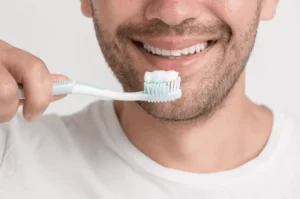
Avoid activities like smoking, heavy lifting, and consuming alcohol for at least two weeks post-surgery to prevent complications. Swelling, tenderness, and bruising are normal after the procedure and should gradually subside as healing progresses.
Routine dental hygiene practices, including brushing and flossing, are vital for maintaining both fixed and removable implant-supported dentures. Specialized cleaning tools can ensure thorough cleaning around the implants and prolong denture life.
Choosing the Right Implant Dentist
Choosing the right implant dentist in Rockville MD is critical for successful upper denture implants. Choose a dentist with advanced training and ongoing education in dental implants. Experience and expertise in handling complications significantly impact procedure success. When you choose a skilled professional, you’ll be making an important step toward achieving lasting results with dental implants in Rockville.
Patient reviews and past results are invaluable when evaluating potential dentists. Modern technologies like 3D imaging and digital scanning enhance the precision and comfort of implant procedures, ensuring a better overall experience. Choosing a dentist who utilizes these technologies can provide peace of mind and improve the likelihood of successful outcomes.
Summary
Understanding the intricacies of implant-supported upper dentures is crucial for making an informed decision. From determining the ideal number of implants to maintaining them post-surgery, every step plays a significant role in ensuring long-term success. The benefits of implant-supported dentures, including improved stability, comfort, and quality of life, make them a superior choice over traditional dentures.
Choosing the right implant dentist and understanding the cost considerations are equally important. With the right approach and care, dental implants can restore not just your smile, but your confidence and overall well-being. Embrace this transformative journey and enjoy the lasting benefits of a well-supported, beautiful smile.
Frequently Asked Questions
How many dental implants are typically needed for upper dentures?
Typically, four to six dental implants are needed for upper dentures to provide adequate stability and pressure distribution. This range ensures effective support and enhances the overall functionality of the dentures.
What factors influence the number of implants needed for upper dentures?
The number of implants needed for upper dentures is influenced by factors including jawbone density, bruxism, and the patient’s preferences for denture stability. These considerations are critical in determining the appropriate treatment plan.
Are fixed or removable implant-supported dentures better?
Fixed implant-supported dentures provide greater stability and comfort, making them ideal for many. However, removable dentures offer ease of cleaning and may be more budget-friendly, so your choice should align with your personal preferences and dental needs.
What are the cost considerations for upper denture implants?
Upper denture implants typically involve higher upfront costs, yet they may prove more cost-effective over time when compared to traditional dentures. Consider insurance options like Delta Dental and Spirit Dental to help mitigate expenses.
How do I choose the right implant dentist?
Choosing the right implant dentist involves selecting someone with advanced training and significant experience in dental implants, as well as a positive reputation among patients and the use of modern technologies such as 3D imaging and digital scanning. This ensures high-quality care and better outcomes for your dental procedures.

